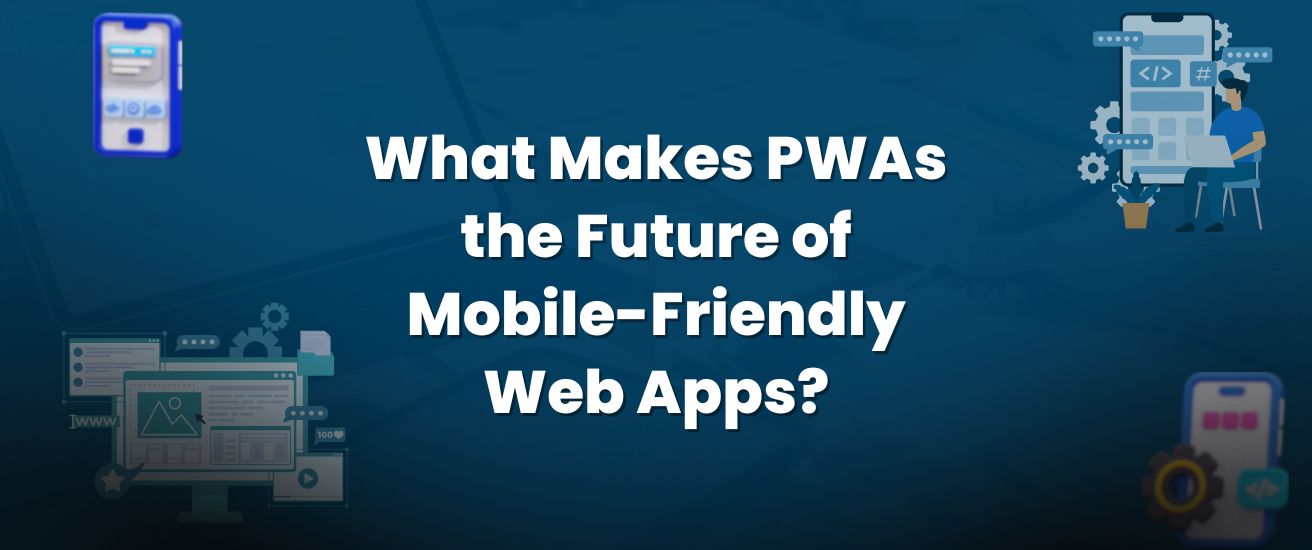What Makes PWAs the Future of Mobile-Friendly Web Apps?

What Makes PWAs the Future of Mobile-Friendly Web Apps?

The digital world is evolving faster than ever, and businesses are constantly seeking innovative ways to deliver seamless user experiences. As mobile traffic continues to dominate the internet, Progressive Web Apps (PWAs) have emerged as a game-changing solution that bridges the gap between web and mobile applications. But what exactly makes PWAs the future of mobile-friendly web apps? Let’s explore.
Understanding Progressive Web Apps (PWAs)
What Is a PWA?
A Progressive Web App (PWA) is a type of web application that uses modern web technologies to deliver an app-like experience directly through a browser. PWAs don’t require installation from an app store, yet they offer offline capabilities, push notifications, and fast performance — just like native apps.
How PWAs Differ from Native Apps
While native apps are built specifically for Android or iOS platforms, PWAs are built using web technologies like HTML, CSS, and JavaScript. This makes them platform-independent and easily accessible across any device with a web browser. No downloads, no updates — just instant accessibility.
Why PWAs Are the Future of Mobile-Friendly Web Apps
1. Lightning-Fast Performance
Speed is everything in today’s digital age. PWAs leverage caching through service workers, meaning content loads almost instantly, even on slow networks. Faster load times lead to lower bounce rates and improved user satisfaction — a major advantage for businesses aiming to keep users engaged.
2. Seamless Offline Access
Unlike traditional web apps, PWAs work offline or in low-connectivity areas. This is achieved through background caching that stores essential data locally. Whether users are on a plane or in a rural area, they can still interact with your PWA effortlessly.
3. App-Like User Experience
PWAs look and feel just like native apps, complete with full-screen modes, app icons, and smooth transitions. Users can “install” them directly to their home screens without going through an app store, creating a frictionless experience.
4. Cost-Effective Development
Developing separate apps for iOS, Android, and web platforms can be expensive and time-consuming. PWAs eliminate that problem by using a single codebase for all platforms. Businesses save on both development and maintenance costs while reaching a broader audience.
5. Improved Engagement and Conversions
PWAs support push notifications — a feature traditionally exclusive to mobile apps. This enables brands to re-engage users with personalized updates, offers, or reminders, ultimately driving more conversions and retention.
6. Enhanced Security
PWAs are served through HTTPS, ensuring secure connections between users and servers. This security measure protects user data, builds trust, and reduces vulnerabilities like content tampering or phishing.
7. Easy Updates and Maintenance
Unlike native apps that require manual updates via app stores, PWAs update automatically in the background. Users always access the latest version without lifting a finger — a convenience that modern consumers appreciate.
The Business Advantages of Adopting PWAs
1. Broader Reach
Since PWAs run on browsers, they’re accessible on any device, regardless of platform. This universality enables businesses to reach users without worrying about app store limitations or compatibility issues.
2. SEO Benefits
PWAs are indexable by search engines, giving them a significant advantage over native apps. This means your PWA can appear in Google search results, boosting discoverability and driving organic traffic.
3. Reduced User Friction
The average user hesitates before downloading new apps due to storage space or data concerns. PWAs remove that barrier completely — they’re lightweight, don’t require installation, and launch instantly from a browser link.
4. Higher Retention Rates
The combination of speed, offline access, and ease of use encourages users to revisit PWAs more frequently than traditional websites. This leads to better retention and brand loyalty.
5. Lower Bounce Rates
Because of their fast loading times and app-like interface, PWAs keep users engaged longer. Studies show that even a one-second delay in load time can reduce conversions — a problem PWAs help eliminate.
Real-World Examples of Successful PWAs
1. Starbucks
Starbucks launched a PWA that lets customers browse the menu, customize orders, and add items to their cart even without an internet connection. The result? A massive increase in daily active users.
2. Twitter Lite
Twitter’s PWA consumes less data and loads 30% faster than the native app, leading to a 65% increase in pages per session and higher engagement among mobile users.
3. Pinterest
Pinterest’s PWA led to a 60% increase in user engagement and a 40% rise in ad revenue. The app’s speed and accessibility made it easier for users to interact with the platform on low-end devices.
Technical Features That Power PWAs
1. Service Workers
Service workers act as background scripts that handle caching, push notifications, and offline functionality. They enable PWAs to deliver consistent performance, regardless of network conditions.
2. Web App Manifest
This JSON file allows developers to control how a PWA appears and behaves once installed on a user’s device — defining icons, screen orientation, and theme colors for a native feel.
3. Responsive Design
PWAs are built to adapt to different screen sizes and resolutions. Whether on desktop, tablet, or mobile, users enjoy a consistent and intuitive interface.
Challenges in Implementing PWAs
While PWAs offer numerous benefits, they’re not without challenges. iOS support for some advanced features remains limited compared to Android. Additionally, businesses need skilled developers familiar with modern web technologies to implement them effectively. Despite these hurdles, the advantages far outweigh the drawbacks, making PWAs a future-proof solution.
Future Outlook: Why PWAs Are Here to Stay
With Google, Microsoft, and other tech giants supporting PWA technology, it’s clear that the future of mobile-friendly web experiences lies in Progressive Web Apps. They combine the accessibility of websites with the engagement of mobile apps — creating a powerful hybrid that’s efficient, scalable, and user-centric.
As users demand faster, more reliable digital experiences, PWAs are set to dominate the next era of mobile web innovation. Businesses that adopt early will gain a competitive edge in customer experience and digital transformation.
Conclusion
Progressive Web Apps represent a major shift in how users interact with digital platforms. They’re fast, reliable, secure, and cost-effective — everything a modern business needs to succeed in today’s mobile-first world. Whether you’re a startup or an enterprise, embracing PWAs is an investment in the future of digital engagement.
Ready to Transform Your Digital Experience?
At Codeed Inc, we specialize in building high-performance Progressive Web Apps tailored to your business needs. Our team of developers ensures seamless functionality, superior speed, and a truly mobile-first experience.
Let’s build the future together — Contact Codeed Inc today and bring your digital vision to life.
FAQs
1. What makes PWAs better than native apps?
PWAs are faster to load, cheaper to develop, and don’t require installation — offering a smoother experience across all devices.
2. Can PWAs work offline?
Yes. PWAs use service workers to cache essential data, allowing users to access key features even without an internet connection.
3. Are PWAs secure?
Absolutely. PWAs use HTTPS to ensure data security and prevent unauthorized access or tampering.
4. How do PWAs help with SEO?
PWAs are crawlable by search engines, which boosts visibility and improves search rankings compared to traditional mobile apps.
5. Is a PWA right for my business?
If your audience relies heavily on mobile access and you want to improve performance, engagement, and conversions, then yes — PWAs are an excellent choice.
Table of Content
 5.0
5.0
Unlock your new design team today
Get a team of skilled professionals and all the benefits that come with top-grade in-house designers—for a flat fee.
Book a free call


